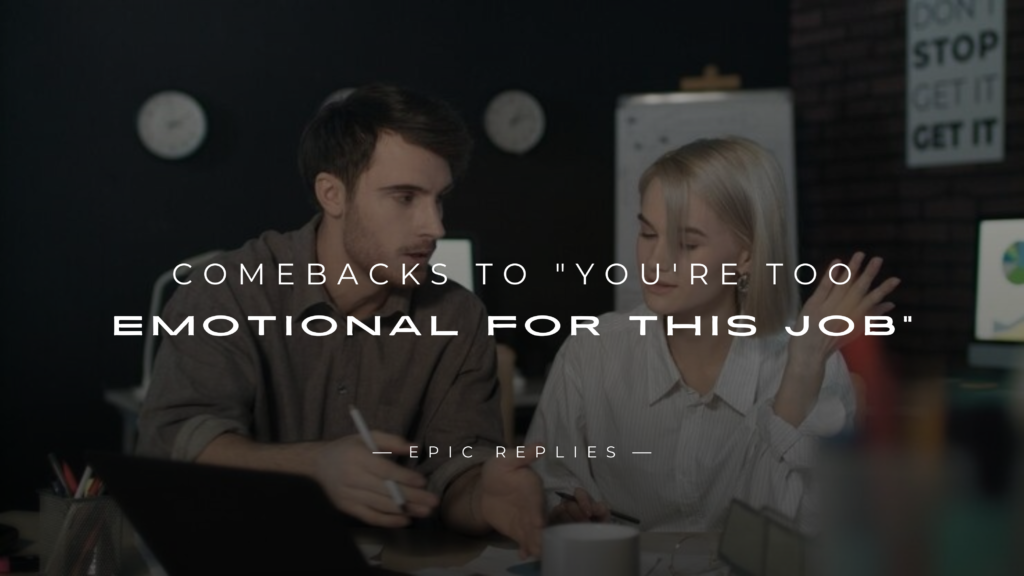Have you ever been told “You’re too emotional for this job”? If so, you know how much it can sting. One sentence can make you feel small, unprofessional, and even doubt whether you belong in your role. The phrase suggests that emotions are a weakness, but the truth is quite the opposite. When handled effectively, emotions are one of the greatest strengths you can bring into any workplace.
The problem lies in how many organizations view emotions. Too often, passion, empathy, or concern are dismissed as liabilities. Meanwhile, detachment and coldness are rewarded as professionalism. This mindset is outdated. Today, emotional intelligence is recognized as one of the most important skills for success in any field.
In this article, we will uncover why people say “You’re too emotional for this job,” how to respond in ways that are confident and professional, and why emotions are not only normal but vital to thriving in modern workplaces.

250+ Comebacks to “You’re Too Emotional for This Job”
Highlighting Emotional Intelligence
- My emotions help me read the room faster than most people.
- Emotional awareness helps me anticipate problems before they spiral.
- I connect with clients better because I actually understand how they feel.
- I notice subtle shifts in tone that others overlook.
- Emotion is what makes my communication clear and effective.
- Emotional intelligence keeps teams motivated during high pressure.
- I manage conflict better because I understand both perspectives.
- My emotions let me lead with compassion, not fear.
- Emotional intelligence builds trust faster than spreadsheets do.
- A good leader listens with both head and heart.
Reframing Emotion as Strength
- Caring deeply means I do not cut corners.
- My emotions push me to do my best work.
- Passion fuels persistence and persistence delivers results.
- Empathy helps me build lasting relationships.
- Being emotional means I am invested, not indifferent.
- I channel emotion into focus and drive.
- Emotion is not weakness, it is energy.
- My emotions keep me committed when things get tough.
- Caring makes me double check my work.
- My feelings keep me connected to the purpose of the job.
Pointing to Results
- My last project succeeded because I cared enough to go the extra mile.
- Results prove that my emotions push me forward, not backward.
- I hit targets consistently because I take ownership.
- Look at my track record, it speaks louder than labels.
- My emotions keep me persistent until goals are reached.
- Clients return because they feel understood, not dismissed.
- Passion delivers outcomes, and I have proof of that.
- My performance reviews show emotion is a strength.
- Emotions help me connect which leads to higher success rates.
- If results are the measure, then my emotions clearly work.
Clarifying Misinterpretation
- I am passionate, not unprofessional.
- Expressing emotion is not the same as being unstable.
- Caring deeply does not mean I lack control.
- I speak up because I value the work.
- My emotions do not distract, they guide.
- What you see as emotion is actually commitment.
- My tone reflects energy, not weakness.
- I am invested, not fragile.
- Expressing care is different from being overwhelmed.
- I am emotional because I care about excellence.
Appealing to Modern Leadership Standards
- Emotional intelligence is ranked as a top leadership skill today.
- The best companies hire for empathy and adaptability.
- Leaders succeed now because they connect, not because they suppress.
- Research shows emotional intelligence outperforms technical skill alone.
- Workplaces thrive when emotions are respected, not shut down.
- Being emotionally aware makes me more effective as a collaborator.
- Modern management requires empathy to retain top talent.
- Today’s leaders are judged by how well they understand people.
- Emotional awareness is considered an asset, not a flaw.
- Forward thinking companies want leaders with emotional depth.
Playful Deflection
- Better emotional than boring, right?
- At least I am not allergic to feelings.
- Imagine how dull the office would be without me.
- My emotions make work less robotic.
- At least I bring energy to the table.
- Emotional beats unengaged every time.
- If feelings are the problem, maybe I should rent a robot suit.
- I guess passion is just my superpower.
- Someone has to keep things human here.
- Emotional? Maybe, but that is why people like working with me.
Humor Twist
- Emotional? Then I must really care about spreadsheets.
- I only cried once, when the printer jammed for the fifth time.
- Emotional? Wait until you see me around free pizza.
- If passion counts as emotional, then guilty.
- I cry happy tears when deadlines are early.
- Emotional? Only when the WiFi goes down.
- At least I do not rage when the coffee runs out.
- I promise not to sob into the budget report.
- If caring is emotional, I am practically a superhero.
- Emotional? Cool, maybe I will start charging for therapy sessions.
Sarcasm Flip
- Sorry for not being a robot.
- My mistake for caring about the work.
- Next time I will program myself to feel nothing.
- Thank you for noticing that I am human.
- Sorry, I left my heart at home today.
- Maybe I should practice my monotone voice.
- Yes, passion is such a terrible flaw.
- Forgive me for giving a damn.
- I will work on becoming colder if that helps.
- Right, because empathy is so dangerous.
Over the Top Agreement
- You are right, I tear up over staplers daily.
- Emotional? I almost cried at lunch when they ran out of fries.
- Yes, I wept openly when the printer jammed.
- You should have seen me sobbing over PowerPoint slides.
- I practically need tissues to read emails.
- Oh yes, I am overwhelmed with feelings about the break room coffee.
- Every spreadsheet makes me misty eyed.
- You are right, I almost fainted during the team meeting.
- Emotional? I am basically a walking Hallmark card.
- Just wait until you see me watching cat videos.
Quick Self Confidence
- Emotions are what give me drive.
- Being passionate makes me effective.
- Caring deeply means I excel.
- My emotions are my edge.
- People trust me because I am authentic.
- My feelings fuel my focus.
- Emotion is what makes me strong, not weak.
- I succeed because I care.
- Passion is my productivity booster.
- My emotions are part of why I am good at this.
Questioning the Standard
- Why is showing emotion treated as a weakness here
- Do you think caring too much is actually a problem
- What makes you believe emotions are unprofessional
- How does being unemotional make someone better at this role
- Can you explain how ignoring feelings leads to success
- Why is detachment considered more valuable than connection
- Who decided that emotion and professionalism cannot go together
- Do you think the best leaders in history lacked emotion
- How do you define being too emotional exactly
- Are you suggesting empathy has no place at work
Turning It Around
- Would you rather I not care about the outcome
- So being detached is what makes someone effective
- You mean having zero emotion is better than being invested
- How does ignoring issues help solve them
- If I was indifferent, would that make me more qualified
- So passion is a liability now
- Are you saying that indifference is the standard for excellence
- Should we measure success by lack of care instead of results
- You want less humanity and more distance in this job
- So what you are looking for is apathy, not commitment
Calling Out Double Standards
- Funny how when men show emotion it is called leadership
- If a man raised his voice, would you call it passion or being emotional
- Interesting that empathy is praised in leaders but criticized here
- Why is it acceptable for executives to show frustration but not for me to show care
- When senior staff show emotions, are they ever told this
- If I was a different gender, would this comment sound the same
- Leaders in this company display emotion all the time, why is mine different
- Why is strength in emotion applauded in some but not in others
- Do you apply this same standard consistently across everyone
- So emotion is only valuable when it comes from the top
Inviting Reflection
- Do you think dismissing emotions creates a healthy work culture
- How would you feel if your care for work was labeled a flaw
- Do you believe teams thrive when people suppress emotions
- Can you see how calling someone too emotional might discourage honesty
- Do you think a workplace should value empathy or silence
- If you had someone in your family working here, would you want them to hide their feelings
- What impact do you think ignoring emotion has on team morale
- Do you believe clients prefer cold responses over genuine ones
- How would you define the balance between caring and professionalism
- Do you think we might be stronger as a team if emotions were respected
Boundary-Setting
- That comment feels dismissive, let us stay focused on my work
- Please keep feedback directed toward results, not personality labels
- I am open to constructive feedback, but not blanket judgments
- Let us keep the conversation professional and skill based
- I would appreciate feedback about performance, not emotional assumptions
- My contributions deserve to be measured by results, not labels
- I prefer conversations that help me grow, not ones that dismiss me
- I am willing to improve but will not accept being reduced to stereotypes
- If we discuss concerns, let us make sure they are tied to actual work
- I value respect in dialogue, can we keep it focused on solutions
Owning It Proudly
- Yes, I am emotional and that is why I care deeply about my work
- I own my emotions because they make me better at what I do
- Emotions are part of my strength, not something to hide
- My feelings help me show up fully for every challenge
- I do not shy away from emotions, I use them to succeed
- Being emotional means I am authentic, and authenticity builds trust
- I embrace my emotions because they connect me to the team
- Emotions are part of what makes me resilient
- I see emotion as a badge of dedication, not a flaw
- I am emotional because I give my best to everything I do
Confidence Boost
- Emotions are my advantage, not my downfall
- I succeed precisely because I care
- Passion and drive are what push me ahead
- Being emotional fuels my resilience
- I trust myself and my emotions guide me well
- My emotional awareness gives me confidence in tough situations
- I am proud of how emotions shape my leadership
- I know my emotions keep me focused on excellence
- Confidence comes from caring and I care deeply
- I would not be as successful if I did not lead with emotion
Strength in Vulnerability
- Showing emotion proves I am honest and authentic
- Vulnerability builds trust faster than pretending to be flawless
- People relate to me because I am real, not because I hide my feelings
- Teams feel safer when they see leaders can be human too
- My openness helps others speak up without fear
- Vulnerability makes connection stronger, not weaker
- When I show emotion, I show courage
- My strength is that I do not pretend to be unaffected
- Owning my emotions makes me more resilient
- Vulnerability has helped me lead people through challenges
Passion as a Driver
- My passion is the reason I deliver strong results
- Passion keeps me going when projects get tough
- I succeed because I am fully invested in my work
- Passion is what fuels late nights and extra effort
- Without passion, work becomes empty, and I do not do empty
- My passion inspires others to push forward too
- Energy and passion are what make me valuable here
- I am emotional because I truly care about the outcome
- Passion makes me dedicated to excellence
- My results are a direct product of my passion
Future-Oriented
- Emotional intelligence is the skill workplaces value most moving forward
- Future leaders will succeed because they connect emotionally
- Companies that dismiss emotions risk losing talent
- Emotional awareness is not optional, it is the future of work
- Tomorrow’s leaders are the ones who can feel and adapt
- The world is shifting toward valuing empathy in leadership
- If this company wants to stay relevant, it needs emotional strength
- The future workplace will reward connection, not detachment
- Emotional intelligence is what drives innovation and collaboration
- In the long run, emotions are not a weakness, they are a necessity
Cutting Clarification
- You mean I care too much, that is not a flaw
- I am not emotional, I am invested
- Caring deeply is not a problem, it is a strength
- What you call emotional, I call committed
- The difference is I show I care, not that I cannot handle it
- Passionate and emotional are not the same as unprofessional
- I express myself clearly, that does not make me unfit
- I am engaged, not unstable
- My emotions are measured, not out of control
- I am driven, not overly emotional
Minimalist Comeback
- Caring is not a weakness
- Passion is power
- I succeed because I feel
- Emotion drives progress
- Being human is an asset
- Caring is my edge
- I am proud of my emotions
- Emotions fuel results
- I will not apologize for caring
- Emotion is strength
Professional Edge
- Let us measure me by results, not labels
- I welcome constructive feedback, but keep it about performance
- My professionalism is proven in my outcomes
- Being emotional has never kept me from delivering
- I meet deadlines and exceed goals, that is professionalism
- I bring both empathy and efficiency to the table
- My results prove that my emotions work for me, not against me
- I show up on time, get the job done, and care about the outcome
- Professionalism is not about suppressing feelings, it is about delivering with integrity
- I am as professional as they come, emotions included
Strong Flip
- Actually, my emotions are the reason I succeed
- What you call a weakness is the strength that sets me apart
- Emotion is my superpower, not my flaw
- If I did not care, I would not perform at this level
- My emotional awareness is the reason I lead well
- I turn emotions into focus and results
- This job requires passion, and that is exactly what I bring
- Emotions are what allow me to inspire others
- Far from a weakness, my emotions give me an edge
- Emotions are not the problem, they are the solution
Final Word
- My emotions enhance my work, not hinder it
- Emotions make me more capable, not less
- This job requires care, and I bring it fully
- Emotions are part of why I am the right fit here
- My emotions push me to deliver at a higher standard
- You cannot separate success from emotion, they go together
- My emotions strengthen everything I contribute
- What I bring is commitment, passion, and results
- Emotions are not disqualifiers, they are amplifiers
- I am emotional because I care, and that is exactly what this job needs
Understanding the Root of the Statement
- Where this comment usually comes from
When someone tells you “You’re too emotional for this job”, it usually says more about them than about you. Often the remark comes from discomfort. They may not know how to manage emotions in themselves or others, so they frame emotions as a flaw instead of a natural part of human interaction.
- Biases hidden in workplace culture
Workplace culture has long celebrated logic, data, and stoicism while undervaluing empathy and emotional awareness. Ironically, these so-called soft skills are the ones that glue teams together and drive productivity. The comment about being too emotional often reflects an ingrained bias that emotions have no place in professional spaces.
- The double standard between men and women
This phrase also exposes a gender bias. When men raise their voices or show passion, they are praised as leaders. When women express the same emotions, they are criticized as being too emotional. This double standard has existed for decades, and recognizing it helps you see that the comment is less about your actual performance and more about outdated perceptions.
Why Emotions Are Not a Weakness
- Emotional intelligence as a strength
Emotional intelligence, often referred to as EQ, is now as important as IQ in the workplace. It involves self-awareness, empathy, and strong communication skills. Employees with high EQ handle conflict better, adapt more easily, and build stronger professional relationships. Far from being a weakness, emotional intelligence sets people apart as leaders.
- How empathy builds stronger teams
Teams thrive when people feel understood and valued. An empathetic colleague or manager creates an environment where collaboration is easier and innovation flourishes. Without empathy, teams often fall into toxic patterns, poor communication, and low morale.
- Real-world examples of emotion-driven leadership
Leaders like Oprah Winfrey and Jacinda Ardern built reputations on compassion, empathy, and authenticity. Their ability to connect emotionally with others not only earned respect but also created meaningful change. These leaders are proof that being emotional does not hold you back but instead drives success.
Smart Ways to Respond Without Losing Confidence
- Stay calm and avoid impulsive reactions
If you immediately lash out when someone says “You’re too emotional for this job,” they will use it to confirm their point. The best strategy is to stay calm, collected, and confident. That alone proves you are in control of your emotions.
- Acknowledge but redirect the conversation
You can acknowledge their concern and immediately highlight how emotions help your performance. For example, you might say, “I believe my ability to recognize emotions helps me manage situations effectively and improve teamwork.”
- Use professionalism as your shield
Always bring the focus back to your performance. By pointing to measurable results and contributions, you remind others that what truly matters is what you achieve, not how they perceive your personality.
Powerful Comebacks You Can Use
When faced with “You’re too emotional for this job,” silence is not your only option. Here are some powerful responses depending on your style and comfort level.
Professional yet firm comebacks
- “My emotional awareness allows me to solve problems and manage relationships effectively.”
- “I consider emotional intelligence one of my strongest skills in this role.”
Humorous and light-hearted comebacks
- “Better emotional than robotic, right?”
- “At least no one can say I lack passion for what I do.”
Assertive comebacks that flip the narrative
- “If by emotional you mean passionate and committed, I take that as a compliment.”
- “I believe bringing humanity into my work makes me a stronger professional.”
These comebacks keep the tone professional while reminding others that emotions are a valuable strength.
Shifting the Perspective in the Workplace
- How to turn criticism into growth
Instead of letting the comment discourage you, use it to educate others. Point out how emotional awareness benefits collaboration, communication, and problem-solving.
- Encouraging emotional intelligence as the standard
The more workplaces normalize emotional intelligence, the less room there is for dismissive remarks like “You’re too emotional for this job.” Encourage discussions about empathy and communication as professional skills.
- Breaking stereotypes in the workplace
Every time you respond confidently instead of shrinking, you challenge stereotypes. You are not only protecting yourself but also paving the way for others who may face similar criticism.
Mistakes to Avoid When Responding
- Do not lash out
Responding with anger or defensiveness only reinforces the stereotype.
- Do not downplay your strengths
Some people respond by apologizing or promising to be less emotional. That is like apologizing for being human. Never minimize your emotional strengths to fit outdated norms.
- Do not let the remark define you
Remember that one person’s opinion is not a reflection of your value. It does not define your ability or your future.
Building Long-Term Confidence Against Such Remarks
- Practicing self-awareness
The more aware you are of your own emotional patterns, the easier it is to respond with confidence. Self-awareness shows maturity and control.
- Setting respectful boundaries
If someone repeatedly uses this phrase against you, set a boundary by saying, “I appreciate feedback about my work performance, but I would prefer not to receive personal comments about emotions.”
- Knowing your worth
Keep track of your achievements and remind yourself often of the value you bring. Knowing your worth is the best defense against comments that try to undermine you.
Conclusion
At the end of the day, being told you’re “too emotional for this job” says more about the other person than it does about you. Emotions are not a weakness they’re proof of passion, empathy, and dedication. The right comeback doesn’t just shut down negativity, it also reminds others that emotional intelligence is a strength in any workplace. So, the next time someone tries to undermine you, don’t hesitate to stand tall and respond with confidence. And if you enjoyed these comebacks, you’ll also love our list of 250+ Savage Comebacks to “You’re Just a Dreamer” for even more inspiration.
FAQs
Q. How do you respond professionally to “You’re too emotional for this job”?
You can stay calm, acknowledge the concern, and redirect the conversation toward how emotional intelligence helps your performance.
Q. Why do people say “You’re too emotional” at work?
This usually comes from stereotypes, workplace bias, or a lack of understanding about the importance of emotions in communication and leadership.
Q. Can emotions be a career strength?
Yes. Emotions allow you to build stronger relationships, resolve conflicts, and inspire teams, all of which are valuable in career growth.
Q. How do you set boundaries when colleagues dismiss your emotions?
You can politely set boundaries by saying, “I’d like feedback to focus on my work performance instead of my personality traits.”
Q. Is humor a good way to respond to emotional criticism at work?
Yes. Humor can be a powerful way to defuse tension while showing confidence. Just make sure it remains light and professional.




